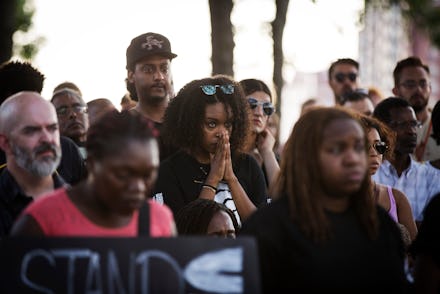Meet the Former Ad Executive Trying to Make Abortion a #BlackLivesMatter Issue

Ryan Bomberger is a man on a mission. He's spent years — "the better part of [his] adult life," he told Mic — "working in various urban outreaches." A biracial black man who now runs an anti-abortion group called the Radiance Foundation with his wife, Bethany, he credits his own life story as proof of the promise of an anti-abortion stance. "I'm alive and my adopted children are alive because we were spared from abortion," he said.
Bomberger is also an experienced, savvy advertising executive. He worked on a show that won a regional Emmy in 2009. On his LinkedIn page, he describes himself as a "provocateur" whose five-plus years as co-founder and chief creative officer of the Radiance Foundation has "peel[ed] back the layers of history, politics, pop culture and media hype to reveal how current issues and ideologies affect our sense of purpose and living meaningful lives."
"What my career in advertising taught me is that every word matters," Bomberger said.
It's with that in mind that he's tried to craft his message around the popular protest movement and slogan #BlackLivesMatter, which has helped put police brutality against black communities into the national spotlight and has muscled its way into the 2016 presidential election. "When we say that black lives matter, we either have to mean they matter throughout the entire spectrum, or only some of the time," Bomberger said. "We have to believe black lives matter no matter where they are or when they are."
As Akiba Solomon details at Colorlines, there's a long history of anti-abortion rhetoric in black communities. Much of it has centered on the idea of "black genocide," particularly in the face of white racism. But it's circular logic, according to black reproductive justice advocates, who argue that yes, "the abortion rate for black women is almost five times that of white women." But that fact is being exploited, according to Susan A. Cohen, vice president for public policy at the Guttmacher Institute. In 2008, she wrote the following:
These activists are exploiting and distorting the facts to serve their antiabortion agenda. They ignore the fundamental reason women have abortions and the underlying problem of racial and ethnic disparities across an array of health indicators. The truth is that behind virtually every abortion is an unintended pregnancy. This applies to all women — black, white, Hispanic, Asian and Native American alike. Not surprisingly, the variation in abortion rates across racial and ethnic groups relates directly to the variation in the unintended pregnancy rates across those same groups.
That hasn't stopped anti-abortion advocates like Bomberger from using the language of racial oppression to talk about abortion. In recent years, Bomberger has gained a degree of national prominence by putting his advertising chops to use with websites and billboards that speak directly to black communities about abortion. He has helped put up billboards in New York and Georgia alleging that "the most dangerous place for an African-American is in the womb."
Bomberger has latched onto the right-wing furor surrounding videos purporting to unveil Planned Parenthood's alleged sale of fetal tissue for medical research by tweeting out an image of a blood-stained drain sink accompanied by the text, "How can we rise when we flush our future down the drain?" The image takes direct aim at civil rights organizations like the NAACP and the Congressional Black Caucus for "actively partner[ing] with the nation's largest abortion chain, Planned Parenthood." The message ends with the hashtags #PPsellsbabyparts, #BlackLiversMatter (a conservative take on the alleged organ sales) and #AllLivesMatter.
#BlackLivesMatter co-founder Alicia Garza responded on Twitter:
His disagreements with the movement haven't stopped him from trying to engage with its activists. The Radiance Foundation's Twitter account has used the #BlackLivesMatter hashtag to make sure that users also see its anti-abortion messages:
Bomberger says he's been particularly aggrieved with the fact that #BlackLivesMatter arose out of anger over the deaths of black men like Mike Brown and Eric Garner while, in his view, staying silent around the 2013 death of Tonya Reaves, a black woman who died of a hemorrhage hours after receiving an abortion in Chicago. When confronted with the fact that #BlackLivesMatter was started by three black women, Bomberger responded, "I find it even more ironic."
Correction: Aug. 4, 2015